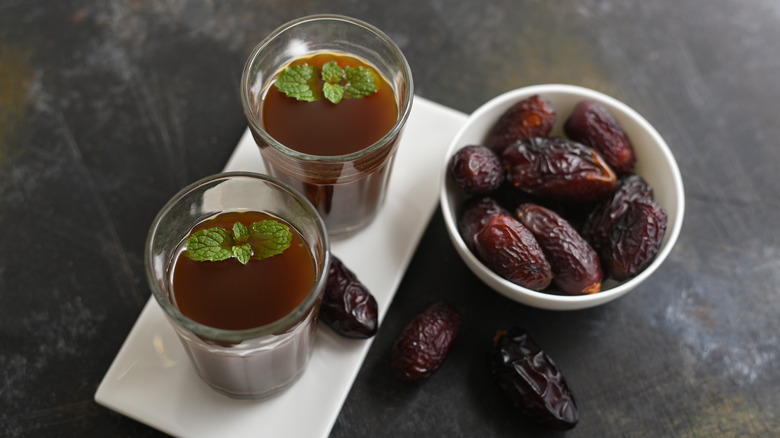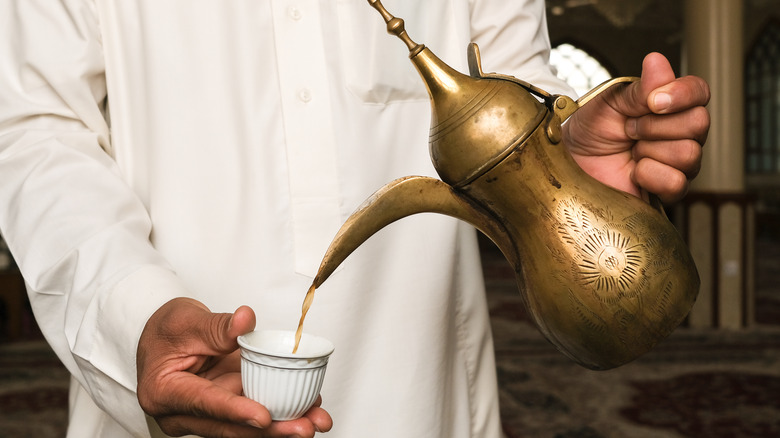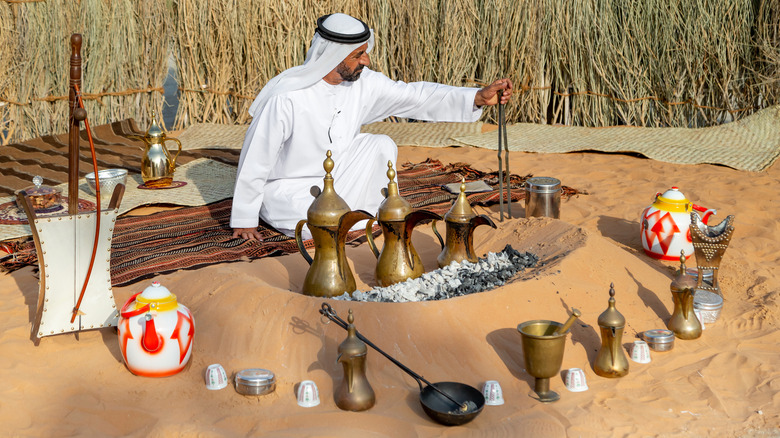The Cultural Significance Of Qahwa Coffee
Coffee has been around for centuries since its beginnings in ancient Ethiopia, but its cultivation and trade actually started by the 15th century in the Arabian Peninsula, where early coffee houses — also known as qahveh khaneh – were gathering places for conversation, music, performances, chess games, and other social activities (via the National Coffee Association). Given coffee's importance in Arab societies, it's no surprise that the brew and its rituals have survived from generation to generation.
Yemeni growers gave coffee the Arabic name "qahwa," and the beverage was once used by Sufi mystics to help focus and achieve spiritual intoxication while chanting, per BBC News. Qahwa, as well as the traditional method of sharing it within private homes and wider society, eventually became associated with hospitality. In fact, this coffee is such an important part of Arab culture that it's been officially recognized by the United Nations Educational, Scientific and Cultural Organization (UNESCO).
Qahwa's cultural and religious connections
After the United Arab Emirates (UAE), Saudi Arabia, Oman, and Qatar petitioned for the inclusion of qahwa in its Representative List of the Intangible Cultural Heritage of Humanity, UNESCO recognized the significance of Arabic coffee in 2015, stating that the way it's prepared, served, and consumed is an "expression of hospitality, generosity and social etiquette" that affects all aspects of Arab societies. The method of brewing qahwa and its traditions have been handed down throughout the generations, thanks to family members and culture bearers such as elderly Bedouin men and women, sheikhs, tribal heads, and coffee purveyors.
Khalid Al Mulla, a coffee museum curator in Dubai and national coordinator for the UAE chapter of the Specialty Coffee Association, told Perfect Daily Grind that the act of making and serving qahwa transcends the class divide because, regardless of your socioeconomic status, it can be used to welcome a visitor into your home, even when resources are limited. The coffee also holds a place during special occasions and cultural or religious holidays, including Ramadan and Eid, and can be found in many public areas, such as government offices and airports.
Brewing and serving qahwa
Qahwa takes slightly different forms across the Middle East, but it's typically made with arabica beans, per Visit Saudi Arabia. The Saudi variation is rich, unfiltered, and unsweetened, and can also be infused with spices such as cinnamon, saffron, and cloves, depending on the region. As in many Arab countries, qahwa is brewed and served in a dallah, a traditional lidded pot that is usually made from brass or stainless steel. You can find an image of this vessel on Arabic currencies, like the dirham coin in the UAE.
UNESCO notes that the act of preparing and serving qahwa is ceremonial in nature, with guests observing the process. The tradition involves selecting the coffee beans, giving them a light roast in a pan over a fire, and grinding them with a copper mortar and pestle. These grounds are placed inside a dallah, which is then filled with water and placed on the fire. Once the qahwa is ready, the one serving should be standing while guests are sitting down and pour the coffee into fenjals — small cups with no handles — from high above. The first cup should go to the eldest or most distinguished guest. Qahwa is often served with sweet accompaniments that balance out its natural bitterness, such as candied fruits, figs, or dates.
The fenjals get refilled in small amounts over and over, but customarily, no one drinks more than three cups.


